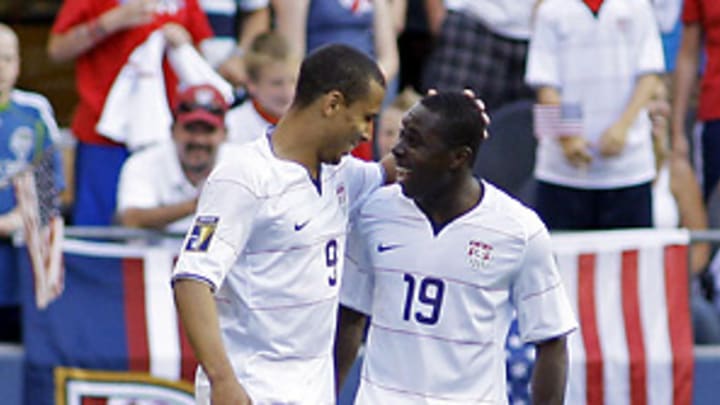U.S. sowing the seeds of possibility

The Confed Cup games against Egypt, Spain and Brazil were, of course, magical. I spent an extra week in South Africa after the tournament, and everywhere I went, the country's soccer fans still buzzed about "America's very strong team." The win over Spain and the near-miss against Brazil earned the U.S. accolades from the tastemakers of global football, and for a little while, at least, it seemed like the blogosphere was unable to play its favorite sport: bashing Bob Bradley. So this was what it was like to be a footballing power.
Then the U.S. came home to play ... Grenada. (Cue pin drop or record screeching.) But it is precisely this moment in which the U.S. needs to be sharpest. Nothing is a bigger letdown than, well, a letdown. And there's a lot to play for in this tournament, especially against the likes of Honduras and the other Hexagonal challengers.
On the surface, this year's Gold Cup means very little. The champion doesn't get an invitation to the next Confederations Cup (that goes to the 2011 Gold Cup winner) and most of CONCACAF's energy is rightly focused on the Hexagonal, most electrically on the Mexico-U.S. qualifier next month.
Which isn't to say the current tournament is occurring in a vacuum. It's an audition for the young and/or still-unproven players called in, such as Robbie Rogers, Stuart Holden and Brad Evans. (They did well enough against Grenada to earn a call-back, that's for sure; although the recall of BennyFeilhaber hints at some disappointment on the part of Bradley.) That was the whole point of Bradley naming the roster he did: to allow some on-the-brink guys to stake their claim for consideration on next year's World Cup team and some on-the-fringe guys to show their stuff.
But at the same time, this is also not a simple tryout. The results matter. And, because of the Confed Cup performance, they matter a lot. In South Africa, after being asked repeatedly about how "lucky" the U.S. was to advance to the knockout stage, U.S. Soccer President Sunil Gulati pointed out that luck had nothing to do with it. After all, the games were played straight up on the field and the results came out the way they did based on competitive performance. "The only time luck was involved," he said, "was in the draw."
Ah, the draw -- the Russian roulette of the soccer world. It always smells of hanky-panky, rife with rumors of frozen envelopes and misshaped Ping-Pong balls, as certain teams wind up with easy draws while others find themselves staring down the barrel of the Group of Death. Nothing has ever been proven, of course. So the only reliable way a team can guard against a tough fate is to improve its seeding.
FIFA has yet to announce how the seeding for the 2010 World Cup will work (opening itself up to more accusations of backroom shenanigans), but if Germany '06 was any indication, a team's official FIFA ranking is vital. Leading into the last World Cup, FIFA used some sort of differential calculus even Gottfried Leibniz would have trouble understanding that quantified a team's performance at the previous two World Cups as well as its ranking.
That's how Mexico ended up a top seed in '06. While the U.S. was forced to play in the Group of Death with Italy, the Czech Republic and Ghana, Mexico found itself in the "Group of la Vida Loca" with Portugal, Iran and Angola.
Now, the U.S. did very well in '02, finishing in eighth place, but it crashed back to earth in '06, finishing officially 25th. Unfortunately, the way the seeding system has worked, the most recent Cup is weighted, so that 25th-place finish would hurt the U.S. more than the eighth-place finish would help. Still, there are the rankings, which is where things could get interesting -- and where the Confed Cup results come in. Beating Spain and reaching the final lifted the U.S. two spots from the previous month to No. 12 in the FIFA rankings.
You input all this into an abacus and suddenly, the U.S. has a legitimate shot at being a top seed at the World Cup, which could mean the difference between an early exit next summer or another Cinderella story.
Now, even with the rankings, it's highly unlikely the U.S. will get a top seed given the mathematical gymnastics required (whenever FIFA decides on the seeding system). But then again, it was also highly unlikely the U.S. would beat Egypt and Italy would fall to Brazil in South Africa a few weeks ago. And it's perfectly conceivable the U.S. could overtake No. 11 Greece and No. 10 Croatia in the rankings, and given the way No. 8 Argentina is playing right now, maybe even that team. Boy, would that burn Diego Maradona.
But if there's any hope, the U.S. must continue to get results, especially against the other good teams in CONCACAF, such as Honduras, the Americans' opponent on Wednesday night (9 p.m. ET, Fox Soccer Channel, TeleFutura). Beating Grenada doesn't move the needle. Beating Honduras, the fourth-highest-ranked CONCACAF team (No. 39), doesn't either, but it does help solidify the U.S.' standing. And a loss, of course, could do some real damage.
Before the Confed Cup, the chances the U.S. would get a top seed were nil. Now they are slim. By simple math, slim is better than nil.
